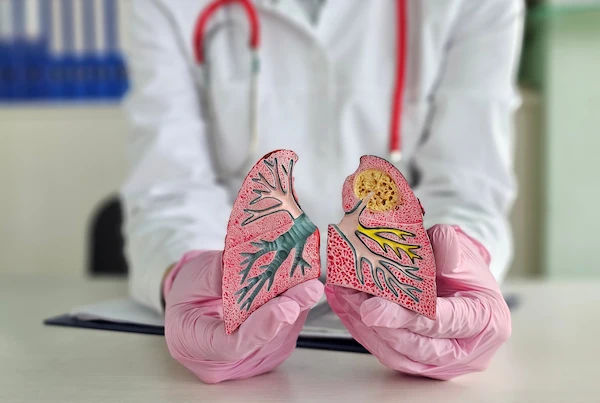What Leads to Signs Of Bronchitis: Uncovering the Root Causes
Know about bronchitis, types, causes, triggers, risk factors, how the disease develops and when to seek a doctor's advice.

Written by Dr. J T Hema Pratima
Reviewed by Dr. Shaik Abdul Kalam MD (Physician)
Last updated on 13th Jan, 2026

Introduction
Feeling a persistent, nagging cough that just won't quit? You might be dealing with bronchitis. This common condition, characterised by the inflammation of the bronchial tubes, the airways that carry air to your lungs, can leave you hacking, wheezing, and utterly exhausted. But what exactly flips the switch, turning a simple cold into full-blown bronchitis? Understanding the "why" behind your symptoms is the first step toward effective treatment and prevention. This article will demystify the primary causes of bronchitis, from the most common viral invaders to the environmental and lifestyle factors that significantly increase your risk.
Understanding the Two Main Types of Bronchitis
Before diving into the causes, it's essential to distinguish between the two primary forms of bronchitis, as their origins differ significantly.
1. Acute Bronchitis
This is the more common and temporary form. It often develops from a cold or other respiratory infection and typically improves within a week to 10 days, though the cough can linger for several weeks. It is most often viral in nature.
2. Chronic Bronchitis
This is a more serious, long-term condition characterised by a productive cough that lasts for at least three months and recurs for two consecutive years. It is one of the main diseases categorised under Chronic Obstructive Pulmonary Disease (COPD) and is primarily caused by long-term exposure to irritants.
Consult Top Specialists for Personalised Tips
The Primary Causes: What Triggers Bronchitis?
The signs of bronchitis—cough, mucus production, shortness of breath—are a direct result of inflammation in the bronchial tubes. This inflammation is triggered by specific agents.
Viral Infections: The Most Common Culprit
An overwhelming majority of acute bronchitis causes are viral. When you catch a cold or the flu, the infection can start in your nose and sinuses and then travel down into your airways, leading to bronchitis.
Common Viruses Include: Rhinovirus, influenza (flu), parainfluenza, respiratory syncytial virus (RSV), adenovirus, and coronavirus (including those that cause common colds, not exclusively SARS-CoV-2).
Bacterial Infections: A Less Frequent Cause
While less common, bacteria can sometimes cause bronchitis directly or infect airways already inflamed by a virus (a secondary bacterial infection). Common Bacteria Include: Bordetella pertussis (whooping cough), Mycoplasma pneumoniae, and Chlamydia pneumoniae.
Environmental and Irritant Exposure
This is the leading cause of chronic bronchitis and a significant aggravator of acute cases. Inhaled irritants cause damage and inflammation to the bronchial lining over time.
- Tobacco Smoke: The leading risk factor for chronic bronchitis. Both active smoking and prolonged exposure to secondhand smoke are major contributors.
- Air Pollution: Smog, vehicle exhaust, and industrial emissions contain fine particles that can irritate the lungs.
- Occupational Hazards: Long-term exposure to dust, chemical fumes, vapours, and organic materials (like grain dust or textile fibres) in workplaces can lead to occupational bronchitis.
- Household Irritants: Dust, mold, strong cleaning product fumes, and smoke from fireplaces can also trigger symptoms, especially in those with sensitivities.
Key Risk Factors: Who is More Likely to Get Bronchitis?
While anyone can get bronchitis, certain factors make you more vulnerable to developing the condition.
Weakened Immune System
Individuals with a less robust immune system have a harder time fighting off the initial infections that lead to bronchitis. This includes:
- The very young and the elderly.
- People with chronic illnesses like HIV/AIDS, diabetes, or cancer.
- Those taking immunosuppressant medications.
Pre-Existing Health Conditions
Certain health issues can make your airways more susceptible to inflammation and infection.
- Asthma or Allergies: These conditions already involve inflamed and sensitive airways, making it easier for bronchitis to develop.
- Gastroesophageal Reflux Disease (GERD): Severe, chronic heartburn can cause stomach acid to irritate your throat and airways, potentially triggering bronchitis.
- Chronic Sinusitis: Persistent sinus infections can lead to post-nasal drip, which constantly irritates the airways.
Lifestyle Factors
- Smoking: This is the single most significant controllable risk factor. It damages the cilia (tiny hair-like structures) that sweep debris out of your airways, impairing your lungs' natural defense system.
- Lack of Vaccinations: Not getting an annual flu shot or being behind on vaccinations like whooping cough (pertussis) and pneumonia increases your risk of contracting these illnesses, which can lead to bronchitis.
How Bronchitis Develops: The Pathophysiology
When a triggering agent (like a virus or smoke particle) enters the airways, the body's immune system launches an attack. This immune response causes:
1. Inflammation: The walls of the bronchial tubes swell.
2. Mucus Production: The irritated lining produces thick, often discoloured mucus to trap the irritant.
3. Narrowed Airways: The combination of swelling and mucus physically narrows the airways, making it harder to breathe and leading to wheezing and shortness of breath.
4. The Cough Reflex: The body's natural response to clear the obstructed airways is to cough.
When to See a Doctor: Warning Signs
While many cases of acute bronchitis resolve on their own, it's important to recognise when professional medical evaluation is needed. If symptoms persist beyond two weeks, consult a doctor online with Apollo24|7 for further evaluation.
- Also seek medical attention if you experience:
- A fever higher than 100.4°F (38°C) that lasts more than a few days.
- A cough that brings up blood or rust-colored mucus.
- Shortness of breath or wheezing that is severe or worsening.
- You have a pre-existing heart or lung condition like COPD, asthma, or congestive heart failure.
Conclusion
Understanding what leads to the signs of bronchitis empowers you to take proactive steps toward protecting your respiratory health. While you can't always avoid the common cold virus, you can significantly reduce your risk by managing key factors: quitting smoking, avoiding lung irritants, practising good hygiene like frequent handwashing, and staying up-to-date on recommended vaccinations. Most cases are manageable with rest and hydration, but recognising the warning signs that indicate a more serious problem is vital. If your condition does not improve after trying these methods, book a physical visit to a doctor with Apollo24|7.
Consult Top Specialists
Consult Top Specialists for Personalised Tips

Dr. Anand Ravi
General Physician
2 Years • MBBS
Bengaluru
PRESTIGE SHANTHINIKETAN - SOCIETY CLINIC, Bengaluru

Dr. Kiran K J
General and Laparoscopic Surgeon
18 Years • MBBS, MS, FMAS, DMAS (Fellow & Dip in Min. Access surg.), FALS- Bariatric & Robotic Surgery
Bengaluru
Apollo Hospitals Bannerghatta Road, Bengaluru
(50+ Patients)

Dr. Saket Goel
General Surgeon
27 Years • MBBS, MS (Surg.)
Delhi
Apollo Hospitals Indraprastha, Delhi
(125+ Patients)

Dr. Nikhilesh Krishna
Bariatrician
7 Years • MS, FMAS, FALBS
Chennai
Apollo Hospitals Greams Road, Chennai

Dr. Sunil Kaul
General Surgeon
30 Years • MBBS, MS, FICS, FIMSA, FMAS
Delhi
Apollo Hospitals Indraprastha, Delhi
(25+ Patients)
Consult Top Specialists

Dr. Anand Ravi
General Physician
2 Years • MBBS
Bengaluru
PRESTIGE SHANTHINIKETAN - SOCIETY CLINIC, Bengaluru

Dr. Kiran K J
General and Laparoscopic Surgeon
18 Years • MBBS, MS, FMAS, DMAS (Fellow & Dip in Min. Access surg.), FALS- Bariatric & Robotic Surgery
Bengaluru
Apollo Hospitals Bannerghatta Road, Bengaluru
(50+ Patients)

Dr. Saket Goel
General Surgeon
27 Years • MBBS, MS (Surg.)
Delhi
Apollo Hospitals Indraprastha, Delhi
(125+ Patients)

Dr. Nikhilesh Krishna
Bariatrician
7 Years • MS, FMAS, FALBS
Chennai
Apollo Hospitals Greams Road, Chennai

Dr. Sunil Kaul
General Surgeon
30 Years • MBBS, MS, FICS, FIMSA, FMAS
Delhi
Apollo Hospitals Indraprastha, Delhi
(25+ Patients)
More articles from Bronchitis
Frequently Asked Questions
Can allergies cause bronchitis?
Yes, severe, untreated allergies can lead to a condition known as allergic bronchitis. The constant inflammation and post-nasal drip from allergies can irritate the bronchial tubes, triggering a persistent cough and mucus production similar to bronchitis.
What is the difference between bronchitis and pneumonia?
Bronchitis is the inflammation of the airways (bronchial tubes), while pneumonia is an infection that causes inflammation in the air sacs (alveoli) of the lungs. Pneumonia is often more severe, with higher fevers and more pronounced shortness of breath, and typically requires medical treatment with antibiotics if bacterial.
How long is acute bronchitis contagious?
If your acute bronchitis is caused by a virus, you are contagious for as long as you have symptoms, particularly a fever. It's best to assume you can spread the illness for several days to a week after symptoms begin. Practising good hygiene is key to preventing the spread.
Can you get bronchitis from cold weather?
Not directly. The cold air itself doesn't cause bronchitis. However, cold weather often forces people indoors, where viruses spread more easily in close quarters. Cold, dry air can also irritate existing respiratory conditions, making you more susceptible to infections.
What helps ease the symptoms of bronchitis at home?
Key home remedies include getting plenty of rest, drinking fluids to thin mucus, using a humidifier or steam inhalation to soothe airways, and avoiding lung irritants like smoke. Over-the-counter cough suppressants may help with a dry cough, but it's best to consult a doctor for advice tailored to your symptoms.




